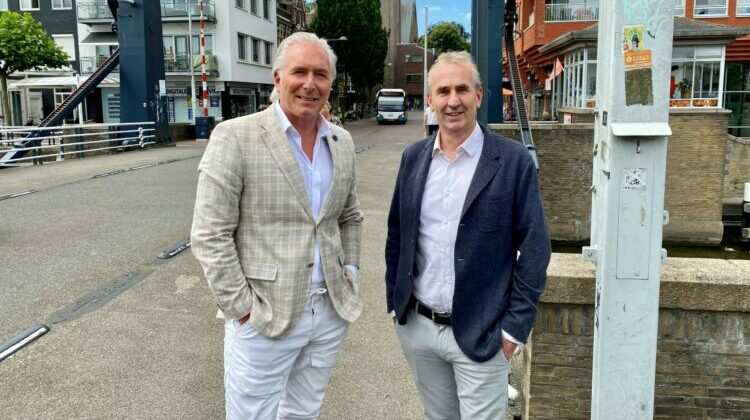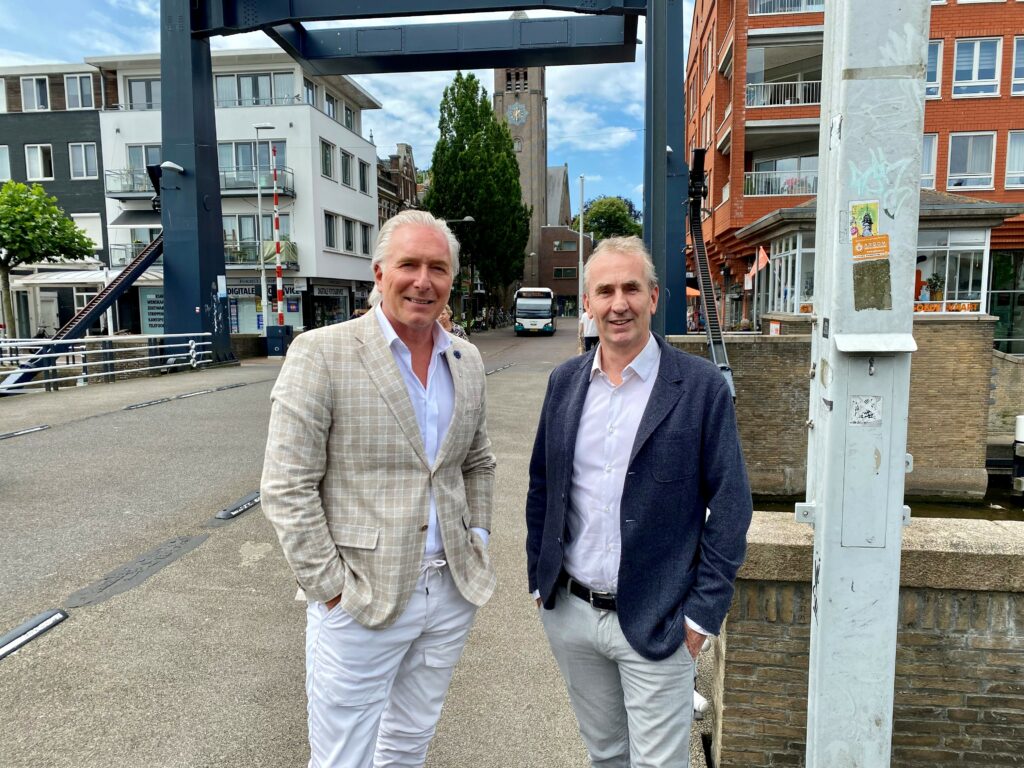
It is exactly 20 years ago this year that Jan-Bert Wissink and Marc van Amsterdam bought Sunair from MyTravel through a management buy-out.
This British parent company was in dire straits and Van Amsterdam and Wissink saw plenty of opportunities for an independent Sunair.
In 2024, the duo looks back on 20 beautiful years that have flown by.
“In all those 20 years, there wasn’t a day that we didn’t laugh.” High time for the one-off column ’20 questions to Jan-Bert Wissink and Marc van Amsterdam’. ‘A weight has been lifted from our shoulders’.
That was the headline of an interview in the then magazine DIT Reismanagement, in 2004, in which I questioned the duo Wissink and Van Amsterdam about their recently completed management buy-out.
At the time, the landscape of the Dutch travel industry looked partly different, with different players.
One of them belongs to the British company MyTravel, owner of Sunair in the Netherlands, among other things.
MyTravel was in dire straits in its home country at the time, plagued by profit warnings, a falling stock price, eventually replacing the top.
Van Amsterdam and Wissink, who had both been working at Sunair in Nieuwerkerk aan den IJssel for four years at the time, saw opportunities for an independent Sunair.
Wissink was brand manager snow/car and Van Amsterdam was director of Sunair and Travel Trend.
In August 2002 they expressed their interest to MyTravel.
It took until shortly after Pentecost 2004 before Wissink and Van Amsterdam were able to uncork the champagne.
Shortly afterwards they moved Sunair to Alphen aan den Rijn, where it is still located.
We meet in a restaurant in the city centre, after a photo session on a pedestrian bridge.
This way we stay in style with the cover photo from 20 years ago, which was taken on a drawbridge in Nieuwerkerk. 1 To get straight to the point: what was your last business disagreement about? Van Amsterdam laughs: ‘It may sound unbelievable, but we’ve never really had any real disagreements. Of course, we sometimes have different insights or ideas, but we have always solved them in good harmony. I think we’ve both always had the same vision for the company, and that helps a lot.” Wissink: ‘Exactly. It’s not that we never have different opinions, but we complement each other. We both have our strengths, and that ensures that we rarely clash. We know where our expertise lies and we rely on that. Of course, it also helps that we’ve been working together for so long; Half a word is enough for us.’ Van Amsterdam: ‘I also think that our personal click also plays a role. We get along well and that makes working together very enjoyable. It’s also important to know that neither of us has a tendency to make a big deal out of anything. We always think in the best interests of the company and our employees.’
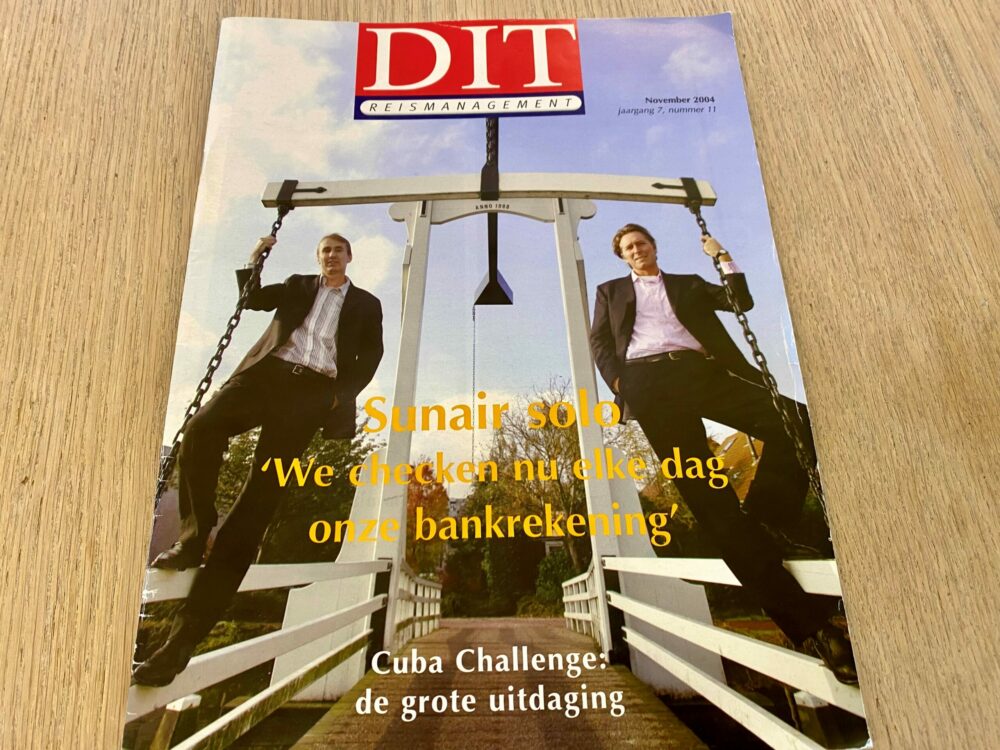
Van Amsterdam: ‘In the beginning, we consciously said to each other: ‘You’re concerned with this, and I’m concerned with that.’ But as time went on, those roles began to merge more and more. We also literally sit across from each other in the office, which means that we are always aware of what the other person is doing. That also makes it easy to divide tasks.’ Wissink: ‘Another factor is that we don’t have a strict hierarchy. On paper, we do have certain responsibilities divided. Marc, for example, is more focused on IT and I am more focused on the financial side, but in practice we just tackle things together. We’ve never felt like we had to check on each other, because we know we’re on the same wavelength.’ Van Amsterdam: ‘We discuss everything that is important and involve each other in decisions. I think that’s one of the reasons why we’ve been working together so successfully for twenty years.’ 3 Where do you know each other from? Wissink: ‘We’ve known each other since 1995. At the time, we were working at Holland International. There was already a professional click there.’ Van Amsterdam: ‘We already worked well together as colleagues at Sunair, but the real partnership only came about when we took over Sunair. We knew that together we made a good team and that we complemented each other well. That also gave us the confidence to take the step towards independence. And despite the fact that we have been working together for so long, we have always maintained a good work-life balance. We don’t interact with each other in private, but we know everything about each other in private.’
4 Have you ever regretted the management buy-out? Wissink: ‘No, not for a moment. From the beginning, we knew this was the right thing to do. Of course, as with any business, there were challenges, but we have never regretted our choice.’ Van Amsterdam: ‘Actually, we might have wanted to do it even earlier, but that wasn’t possible at the time. When the opportunity arose, we grabbed it with both hands. We knew it was a risk, but we were confident that we could make it a success.” 5 What obstacles did you encounter?
Wissink: ‘The transition went relatively smoothly because we were already well prepared. From day one, everything went as planned. Fortunately, we didn’t have any major problems.’ Van Amsterdam: ‘One of the challenges in the beginning was getting used to working with investors; Venturion, Atlantic Capital and Fortis. We were used to doing everything ourselves and suddenly we were dealing with shareholders who had different expectations.’ Wissink: ‘Fortunately, we had good investors who gave us valuable advice. They came from outside the travel industry, so they took a fresh look at our business operations. That has helped us to plan better strategically and make decisions that we might not have considered otherwise.” Van Amsterdam: ‘After a few years, earlier than planned, we decided to buy out the investors. That gave us the freedom to chart our own course without having to take external parties into account.’ 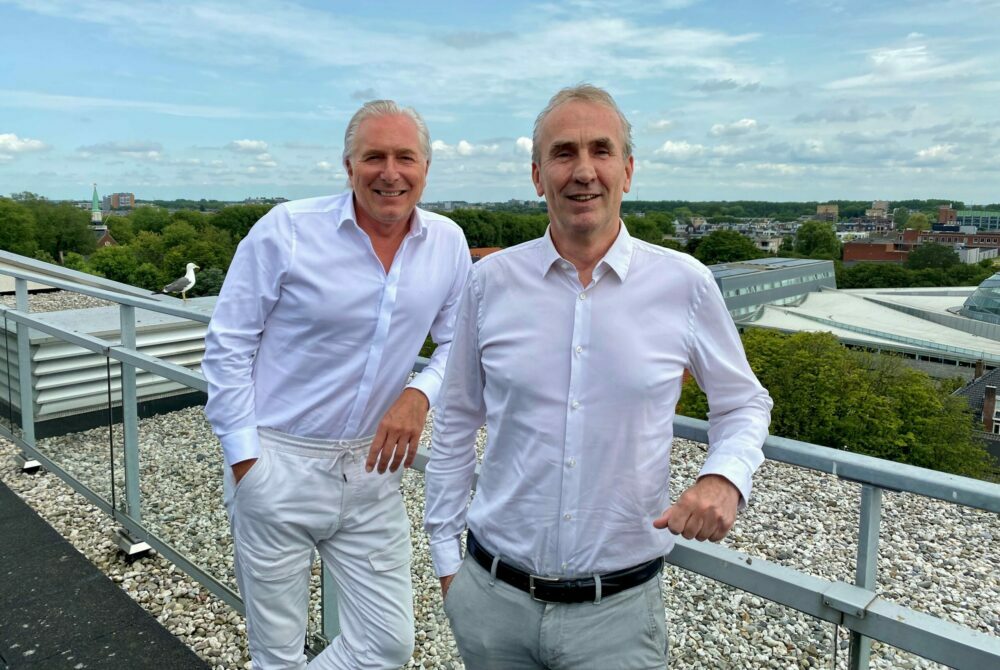
6 And then, suddenly, you stood on your own two feet.
How did you like that? Wissink: ‘We have been completely independent since 2007, each with 50 percent of the shares. We have been debt-free ever since. It gave us a lot of freedom. We were able to define our strategy without having to be constantly accountable to external investors. We were able to switch faster and were more flexible in our decisions.’ Van Amsterdam: ‘We have always used our own money for investments. Many businesses use payments received in advance from customers to fund large marketing campaigns, for example. We deliberately don’t do that. We always stay within our financial means and that has saved us a lot of misery in difficult times. That is one of the reasons why we have weathered the financial crisis and the corona pandemic relatively well.’
7 In short, a conservative financial policy? Wissink: ‘Financial stability is the basis of a healthy company. When you have your finances in order, you can focus on growth and innovation without having to worry about cash flow or debt all the time.” Van Amsterdam: ‘We have always invested in things that are important to us, but always within the limits of what we can afford. This ensures that we as a company are always firmly in our shoes.’ 8 What are you most proud of after twenty years of Sunair?
Van Amsterdam: ‘The fact that we’re still here… And that we are running healthy and well. In a sector that is so turbulent, this is not self-evident. Many of our competitors have disappeared. I am especially proud of our specialization. We’ve always focused on what we’re good at and that’s city breaks and the Channel Islands. That focus has brought us a lot.’ Wissink: ‘And let’s not forget: we have always been in the black, with the exception of the corona year. That’s something we’re very proud of. We have a team that really puts their heart and soul into Sunair. That’s something you can’t buy; You have to build that up and cherish it.’
9 What is typical Sunair? Van Amsterdam: ‘Sunair feels like a family. We are accessible and committed. We don’t have a board of secretaries, our door is always open.’ Wissink: ‘We have always continued to invest in our people and technology. We have a team that has been with us for many years, many people for more than 15 years. This ensures enormous commitment and expertise within our company.’ 10 What do you have to do as a city specialist to distinguish yourself from online providers such as Booking? Van Amsterdam: ‘The strength lies in our service and knowledge. We do much more than Booking can do, both for travel agencies and for our direct customers. In addition, we have an accurate pre-selection of hotels. Sunair is known as a specialist, which is something we have built up throughout our history. We offer excellent service and are easily accessible. Customers are very satisfied, which is evident from positive reviews and the fact that they often come back.’ Wissink: ‘And we make sure that everything is always well organised, from bookings to customer service. We distinguish ourselves through personal contact and involvement.’ 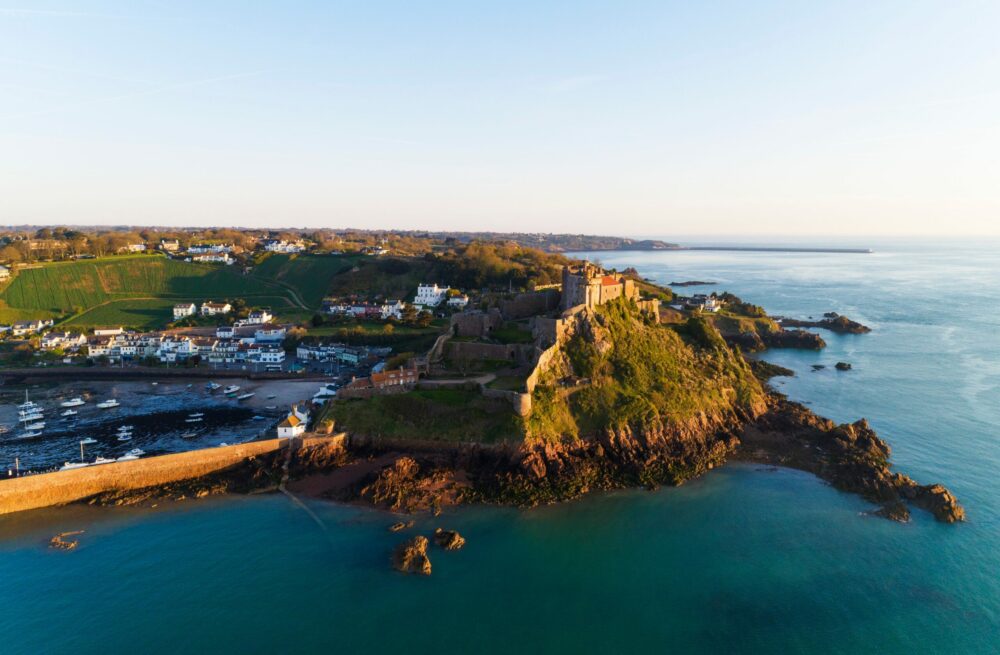
11 What about City Breaks, your direct label? Wissink: ‘It’s going well, we’re seeing steady growth, mainly thanks to repeaters. We are making the necessary investments and it is growing steadily.’ Van Amsterdam: ‘The great thing is that we can still achieve good results with limited resources. That shows that we are doing the right things. In all cases, it’s all about the customer. Whether it’s Sunair or City Breaks, we always strive to provide the best service and be a reliable partner.” 12 Sunair once had three spearheads: cities, cars and snow.
Ever thought about expanding the range again? Wissink: ‘Not really. Snow holidays, for example, are nice, but it’s a short season and requires large volumes that we don’t have. We prefer to focus on what we do best: city trips and the Channel Islands. We are always open to new opportunities, but we stay close to our core products. That has brought us success, we don’t want to let that be diluted.’ 13 Speaking of the Channel Islands, are they not the odd one out?
Or is it a nice niche product? Van Amsterdam: ‘It is certainly a very successful niche product. The Channel Islands have a stable market and mainly attract high-end travellers.’ Wissink: ‘We have good collaborations there, it remains an important pillar within our offer. It’s one of those products that really sets us apart. And for years, departing from Groningen and Rotterdam.’ 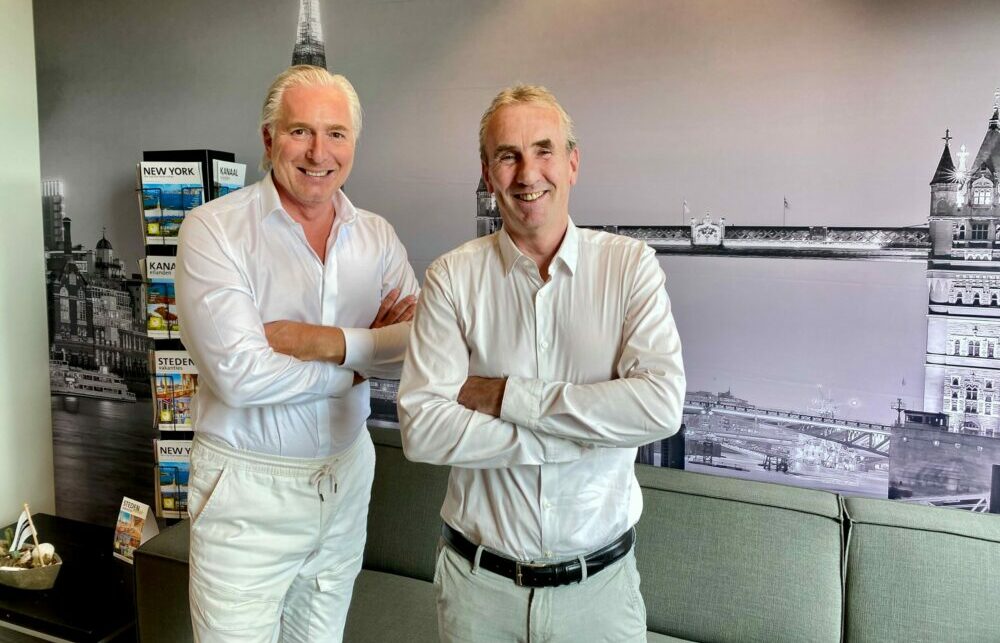
14 How have you seen the travel industry change? Wissink: ‘The biggest change is without a doubt digitisation. When we started, most bookings were still offline, through travel agencies. Now a lot is happening online. That has turned the entire industry upside down. With Sjors, we make it easy for retailers to book with us online.’ Van Amsterdam: ‘Digitalisation has fundamentally changed the way people book travel. It has also brought new challenges, such as the rise of online travel sites and platforms such as Booking.com. But it has also created opportunities, especially for companies that can respond quickly to change.’ 15 How important is your relationship with travel agencies today? Wissink: ‘That relationship is still very important. Sunair has always been, and will continue to be, a travel agency brand. Our customers come through travel agencies, and we’ve always invested in those relationships.” Van Amsterdam: ‘Travel agencies appreciate the fact that we support them with good service, knowledge and a clear product range. That’s why they enjoy working with us. We give good commissions and make sure they can concentrate on other aspects of their work.’ Wissink: ‘Another factor is that we have always been transparent. Travel agencies know they can count on us, and that is very valuable in this day and age. We have no secrets; They know exactly what they can expect from us.’ Van Amsterdam: ‘We really see ourselves as partners of the travel agencies. They are our market, and we do everything we can to maintain and strengthen that relationship. That hasn’t changed in the last 20 years.’ Founded in 1968, Sunair Holidays has always been lean and mean.
The (forecast) turnover in 2023 was 25 million euros, with 28,000 passengers and 14 FTEs.
Is that a good size? Wissink: ‘Yes, we are very satisfied with this size. We have found a good balance between turnover and employees, which enables us to work efficiently.’ Van Amsterdam: ‘Our company can handle more than what we are doing now, but we would rather remain stable than take risks that jeopardise our service or business operations.’ 17 After 20 years, what is still the fun in it?
Wissink: ‘Of course, it helps that we work in a sector that is always on the move. There’s always something new to focus on. And we both love to travel, so it often doesn’t even feel like work.’ Van Amsterdam: ‘We are fortunate that our work takes us to all kinds of beautiful places. In addition, no two days are the same, which keeps it interesting. And perhaps most importantly, we still have fun doing it. We laugh a lot in the office, which is essential. If it’s not fun anymore, then it stops. But as long as we enjoy going to work every day, we can go on for years to come.’ 18 What are your plans for the future?
Have takeover candidates already come forward? Van Amsterdam: ‘We’re not working on it right away, but there are always possibilities. For now, we just want to continue to grow in the way that works for us.’ Wissink: ‘We will remain at least at the current level, and we would prefer to grow a little further. But we’re taking it easy and seeing what comes our way.’ 19 Where do you see opportunities? Wissink: ‘The biggest opportunity lies in the further expansion of our specialisation. The market for city breaks continues to grow, and we can get a lot more out of it. There are always new destinations or hotels that we can add to our offer.’ Van Amsterdam: ‘We can also do even more with technology. Think of improving our booking systems and using data to respond even better to the wishes of our customers.’ 20 What would you do if you could do it all over again? Wissink: ‘I would do it again in a heartbeat. We have learned so much and built up so much. As long as we stay healthy and enthusiastic, I don’t see any reason to stop. We still have plenty of ideas and plans to work with. The market keeps changing, and that keeps it exciting. I see Sunair being an important player in the travel industry for a long time to come.” Van Amsterdam: ‘We have a fantastic team, a great product and a solid strategy. I look forward to continuing to grow Sunair in the coming years.”
Briefly…
What is your favorite city destination? From Amsterdam: ‘Vienna and New York. Two completely different cities, but both have something special for me.’ Wissink: ‘For me, that’s Palma de Mallorca and the other Spanish cities. Life, the people, the climate, it always feels like coming home.’ What would you do if you didn’t work at Sunair? Van Amsterdam: ‘Something to do with boats, perhaps as a broker in ships. I’ve always had a thing for water.’ Wissink: ‘I would probably do something at Médecins Sans Frontières or in the sports sector, for example at NOC*NSF.’ What obnoxiousness of the other person bothers you? Van Amsterdam and Wissink, at the same time (laughing): ‘Actually, nothing. We are so different, but that makes it easy to work together. We don’t have any irritations.’ What city could you live in? From Amsterdam: ‘Still Vienna. If I had to live somewhere else, I’d live there.” Wissink: ‘Palma de Mallorca. It always feels like a second home.’ Which city do you never want to go back to? Both: ‘There is no city we never want to go back to. Every city has something special, if you’re open to it.’
